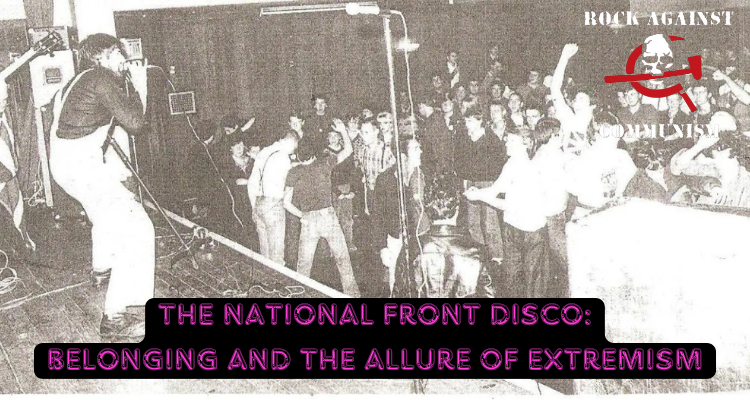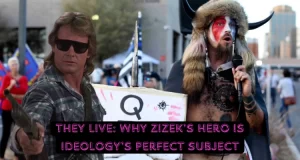Few songs in Morrissey’s discography are as controversial, misunderstood, and uncomfortable as The National Front Disco. Released in 1992, it deals directly with the seductive pull of nationalism, the way identity is formed through exclusion, and the social and material rituals that reinforce belonging.
The genius of The National Front Disco lies in its refusal to moralize—it simply presents the ideological mechanisms that drive people toward extreme identity politics.
Rock Against Communism and the National Front Connection
One possible inspiration for the song comes from Rock Against Communism (RAC)—a movement that, despite its name, wasn’t about music at all, but about embedding white nationalist ideology into British subcultures. The RAC scene emerged in the late ‘70s and ‘80s, a direct reactionary response to leftist punk movements like Rock Against Racism.
Morrissey seems to be engaging with this historical moment, exploring how a young person—like David, the song’s protagonist—might get pulled into these movements.
But The National Front Disco isn’t just about one person’s descent into fascism—it’s about how all ideological identities operate, from punk to Marxism to nationalism.
The Paradox of Identity: Inclusion and Exclusion
One of the most striking things about nationalism, especially its extremist forms, is that it relies on both inclusion and exclusion at the same time.
- To belong to a nationalist movement, you must define yourself against an “other.”
- To maintain group unity, you must constantly reinforce who is and isn’t allowed in.
This same ideological trap ensnares not just nationalists but also modern punks and self-proclaimed “Marxists”. Many people treat punk and Marxism not as tools for changing material conditions, but as identities to maintain.
- Punk stops being about rebellion—it becomes a uniform (“a smelly uniform”), a performance, a subculture to belong to.
- Marxism stops being about revolution—it becomes a label, a set of aesthetics, a club.
David isn’t the only one getting trapped—everyone who prioritizes identity over action falls into the same cycle.
Nationalism is Fun
One of the most overlooked aspects of The National Front Disco is that it highlights something people rarely admit: extremist movements are fun.
“You want the day to come sooner, when you settle the score.”
This isn’t just a political transformation—it’s an emotional and social one. David isn’t becoming a nationalist because he’s reading obscure political theory—he’s hanging out, making friends, and having a good time.
Nationalist groups aren’t strictly political entities—they are social clubs, cultural movements, and communal spaces.
- They throw parties.
- They create rituals.
- They reinforce their identity through shared experiences.
This is why nationalist movements are so difficult to counter—because people don’t just engage with them on a political level, but on a deeply personal and emotional one. It’s the same reason why punk scenes, leftist groups, and activist movements can become insular, performative, and cult-like.
Nationalism, like any other ideology, is reinforced through material rituals of inclusion.
South Park, the KKK, and Rituals of Belonging
There’s a dark absurdity to all of this, which South Park captured perfectly in an episode where Uncle Jimbo and Ned infiltrate a KKK meeting. Instead of focusing on ideology, they find:
- A bake sale.
- A game of “Who’s wearing the craziest thing under their robes?”
- The Klan being regular dudes hanging out.
This isn’t just a joke—it’s a perfect representation of how identity politics operates. It’s not just about hatred; it’s about community, fun, and the feeling of belonging.
The same logic applies to David—his radicalization isn’t just about politics, it’s about having a group to be part of.
Why Does Morrissey Refuse to Condemn David?
One of the reasons The National Front Disco remains so controversial is that Morrissey never explicitly condemns David. The lyrics aren’t from an all-knowing, morally superior narrator—they’re from someone watching helplessly as a friend or loved one drifts into extremism.
“David, the wind blows, the wind blows”
Bits of your life away”
- There’s no anger—only resignation.
- There’s no political rhetoric—only melancholy.
- The song isn’t about fixing David—it’s about losing him.
In a way, Morrissey is acknowledging the larger systemic failure. If someone like David can be radicalized, it’s not just his fault—it’s the fault of a world that didn’t give him anything better.
Conclusion: The National Front Disco as a Warning
The National Front Disco doesn’t tell us what to do, but it forces us to confront an uncomfortable truth: People don’t join extremist movements because they’re evil.
They join because they need identity, community, and belonging. If the left, or any other alternative, can’t provide that—the far right will. And that’s why the song is so unsettling—because it isn’t about David. It’s about all of us.



